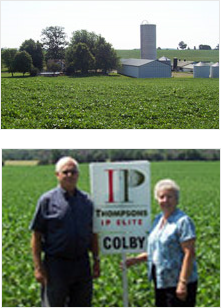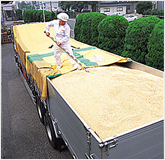Hanamaruki Foods Inc. Thailand Plant, Siam Hanamaruki Co., Ltd.,
obtains food safety certification standards “FSSC 22000” and “BRC” at the same time.
~Accelerating overseas expansion of “Liquid Shio Koji”~
The Thailand plant, Siam Hanamaruki Co., Ltd. (located at WHA Saraburi Industrial Land 60 Moo 4, Tambol Bualoy, Amphur Nongkhae, Saraburi 18140, Thailand) acquired international certification standards for food safety systems; FSSC 22000 on December 22nd, 2020, and “BRC Global Standard for Food Safety” on January 24th, 2021.
With the acquisition of these certifications, we will continue to provide safer and higher quality products to customers all over the world under strict sanitation management.
・Prospects and background for the Thailand plant’s acquisition of FSSC 22000 and BRC certification
In order to provide safe and high quality products, we have considered the implementation of food safety systems in our plants to be our top priority. The Ina plant (located at 2701 Nishiminowa, Ina City, Nagano Prefecture) obtained “FSSC 22000” in May 2016, and the Ohtone plant (located at 1216 Yoshida, Oizumi City, Ora District, Gunma Prefecture) obtained “ISO 22000” in May 2017.
The Thailand factory started full-scale shipment in February 2020 as a dedicated factory for “Liquid Shio Koji”. Since its launch in 2012, “Liquid Shio Koji” sales have grown steadily in Japan and overseas as it is considered to be highly convenient and versatile as a seasoning and, also, taking advantage of its “innovative” manufacturing patent. The Thailand factory was newly established as a strategic base for global supply into the future.
In the food distribution industry, FSSC is an influential framework as a food safety certification standard, and BRC is a standard required by many companies as a transaction condition for product distribution not only in the United Kingdom but also in other European countries and the United States. Therefore, we believe that the acquisition of this certification will accelerate the future development of “Liquid Shio Koji” in overseas markets. Recently, the number of implementation cases of “Liquid Shio Koji” overseas is growing, and through the certifications obtained we have assembled a system that allows for the manufacture and sales of Hanamaruki products that meet our domestic and international customers’ expectations.
With the acquisition of these two certifications, along with the promotion and strengthening of our food safety management system, we aim to expand the sales of “Liquid Shio Koji” all over the world.
・What is “FSSC 22000”?
FSSC 22000 is based on ISO22000 and includes a strengthened food safety management system standard, and approved as one of the benchmark certification schemes for food safety by the non-profit organization “The Global Food Safety Initiative (GFSI)”. The scope of this standard includes the international food safety management system standard ISO 22000, ISO/TS 22002-1(or ISO/TS 22002-4) with future details in the ISO 22000’s prerequisite program, and includes additional requirements specifically for FSSC.
・What is BRC Global Standard for Food Safety?
The BRC Global Standard for Food Safety is a standard for food safety issued by the British Retail Consortium, a non-profit organization that operates a third-party certification scheme. It is a certification system approved by the “Global Food Safety Initiative (GFSI)”. Today, the vast majority of retailers abroad, including the United Kingdom as well as other European countries and the United States, are required to obtain BRC Global Standard certification.
In addition to food safety standards the BRC standard consists of four other types of standards, which include the BRC Global Standard for Consumer Products, BRC/IOP Global Standard for Packaging and Packaging Materials, and BRC Global Standard for Storage and Distribution.
・What is the Global Food Safety Initiative (GFSI)?
The GFSI is a non-profit organization inaugurated in May 2020, managed by The Consumer Goods Forum (TCGF), which focuses on efforts to improve food safety. With the vision of “food safety for all consumers,” it is an international network consisting of members of approximately 400 food business operators in 70 countries around the world.
・Detail of the Thailand plant (Siam Hanamaruki Co., Ltd.)
Address: WHA Saraburi Industrial Land 60 Moo 4, Tambol Bualoy, Amphur Nongkhae, Saraburi, 18140, Thailand
Site area: 16,451 square meters
Industry: Liquid Shio Koji manufacture
Hanamaruki Foods Inc. Ina Plant and Ohtone Plant obtains the certification of FSSC 22000
As of Thursday May 18th, 2017, The Ohtone plant (located at 1216 Yoshida, Oizumi City, Ora District, Gunma Prefecture) was awarded the ISO 22000 food safety standard certification.
Our obtained the certification of FSSC 22000 in June 2016 at the Ina Plant and in May 2021 at the Ohtone Plant.
We are the First company that obtained FSSC22000 from the Miso manufacturer located in NaganoPrefecture.We provide customers with higher quality products through adherence the strict hygiene control levels.
・Prospects and circumstances for our plant’s acquisition of FSSC 22000 certification
To provide safe and high-quality products, we have considered the safety manufacturing systems as the top priority. By achieving the certification, we will continue to make further contributions to the food industry worldwide by providing products that meet the strict hygiene control levels expected by our customers around the world.
・What is FSSC 22000?
FSSC 22000 was developed on FSSC 2200 foundations, and approved as a certification scheme for food safety by the non-profit organization “The Global Food Safety Initiative (GFSI)”. The scope of this standard includes the food safety management system international standard ISO 22000, and ISO/TS 22002-1(or ISO/TS 22002-4, which details the part of ISO 22000’s precondition program.
Four elements, “mutual communication,” “system management,” “precondition program,” and “the HACCP principles,” work together to minimize the risk of food-related harm, providing customers with a safer product. As it contains approximately 200 specific sanitation management requirements, the acquisition of certification is a difficult goal to achieve.
・What is the Global Food Safety Initiative (GFSI)?
The GFSI is a non-profit organization managed by The Consumer Goods Forum (TCGF) and a global network of over 70 food retail industries. It is a very influential food safety regulatory framework in which retailers and suppliers participate, with a scope of over 600,000 stores, approximately 650 companies, and encompassing over 2 trillion dollars in total retail sales.
・Hanamaruki Foods Inc. Ina Plant, Nagano Prefecture, overview
Address: 2701, Nishiminowa, Ina-shi, Nagano Site area
Industry: Miso manufacturing
・Hanamaruki Foods Inc. Ohtone Plant, Gunma Prefecture, overview
Address: 1216 Yoshida, Oizumi City, Ora District, Gunma Prefecture
Industry: Miso manufacturing
Ensuring safe raw materials
 Hanamaruki maintains strong relationships with contracted farmers in order to secure safe raw materials.
Hanamaruki maintains strong relationships with contracted farmers in order to secure safe raw materials.
To ensure the safety of our soybeans, the heart of the miso making process, Hanamaruki is engaged in activities to raise the awareness of our contracted growers.
We started out contracted grower system in 1994.
With the rise of genetically modified crops worldwide, each year since 2004 we have invited some of the top soybean farmers from Canada to come to Japan, aiming to ensure our continued use of non-genetically modified soybeans.
By bringing the farmers to Japan to see miso making and the market, we provide them with a greater understanding of the need for quality and safety.
IP handling
 Identity preserved handling (IP handling) involves separating specific crops in the production and distribution stages in order to prevent mixing them with other crops, certifying them for supply to processors. Hanamaruki only uses non-genetically modified soybeans and performs inspections at every stage of the process, including growing and harvesting, acceptance from the grower, selection, shipping and arrival in Japan.
Identity preserved handling (IP handling) involves separating specific crops in the production and distribution stages in order to prevent mixing them with other crops, certifying them for supply to processors. Hanamaruki only uses non-genetically modified soybeans and performs inspections at every stage of the process, including growing and harvesting, acceptance from the grower, selection, shipping and arrival in Japan.
Farm chemical testing
Approximately 800 types of farm chemicals are used around the world. The Japanese Positive List System was enacted in May 29, 2006, to set standard values for all farm chemicals.
Hanamaruki carries out farm chemical residue testing to ensure compliance with the Positive List System.
Radioactive substance detection system
We currently undertake examination for radioactive substances in farm products (e.g. rice and soybeans). We also conduct monitoring of raw materials that is used in our instant miso soups and other such products.
